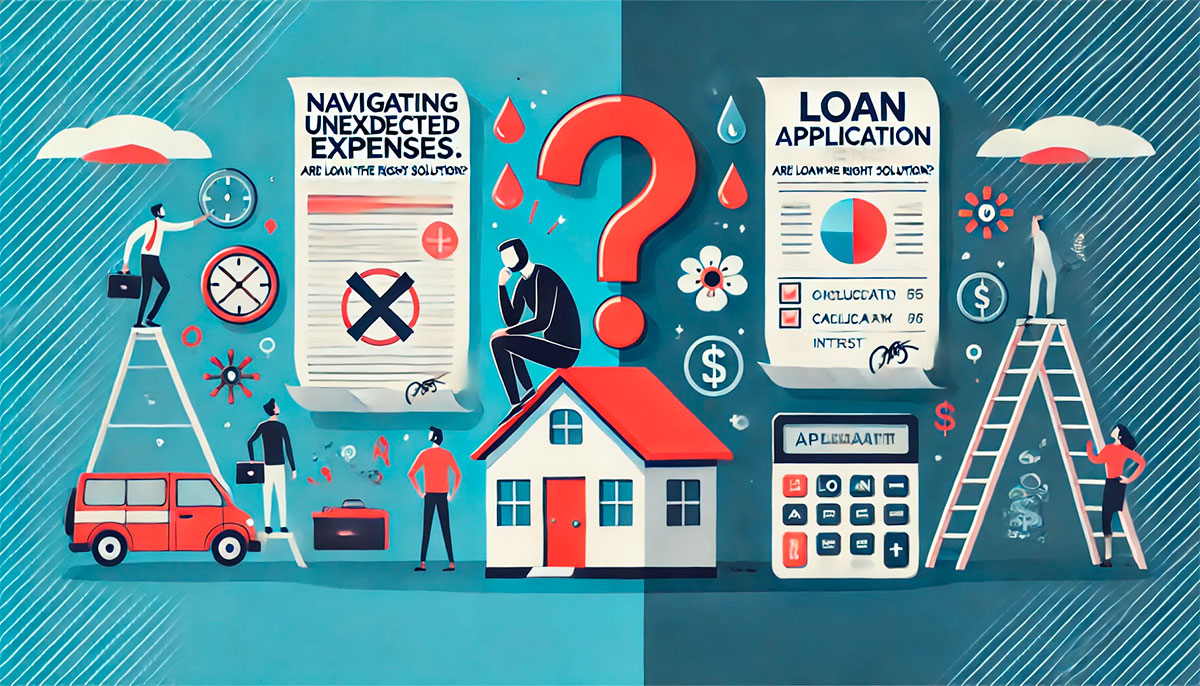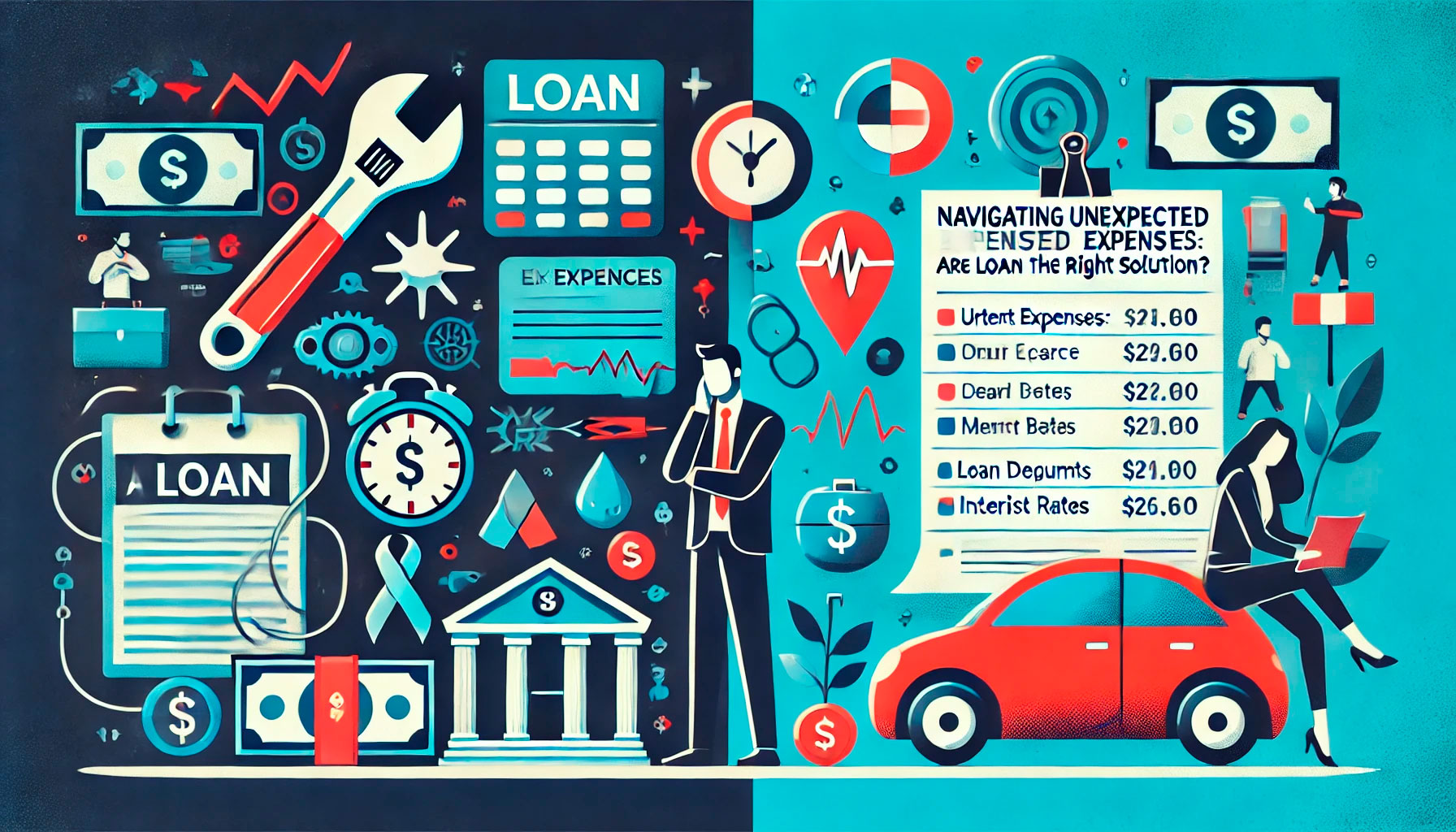Unexpected expenses can happen at any time, from medical emergencies to urgent car repairs or home maintenance issues. In moments of financial strain, loans often seem like an attractive option to cover these unforeseen costs. But are loans the smart choice for handling unexpected expenses, or do they carry risks that outweigh the benefits? In this article, we will explore the pros and cons of taking out loans for unplanned expenses and help you make an informed decision.
When Is Taking a Loan for Unexpected Expenses a Smart Decision?
1. Immediate Access to Funds
One of the biggest advantages of taking out a loan for unexpected expenses is the immediate access to funds. Whether it’s a medical emergency, a major car breakdown, or urgent home repairs, loans provide quick capital that can help you address the issue without delay. Waiting to save up for these expenses may not always be possible, and a loan can offer an immediate solution.
For example, if your car suddenly breaks down and you need it for work, taking out a loan can help cover the repair costs, allowing you to get back on the road without disrupting your income.
2. Avoiding High-Interest Credit Cards
Many people turn to credit cards in emergencies, but this can result in high-interest debt that quickly snowballs out of control. In comparison, personal loans often have lower interest rates, making them a more cost-effective option for handling unexpected expenses. Using a loan rather than maxing out credit cards can help prevent the accumulation of unmanageable debt.
If you’re facing a significant unexpected cost, such as a medical bill, using a personal loan with a fixed interest rate and predictable payments can be more manageable than relying on revolving credit at high-interest rates.
3. Managing Budget Disruptions
Unexpected expenses can throw even the most carefully planned budget off balance. Loans provide a way to spread the cost over time, which can minimize the immediate financial impact. Instead of draining your savings or leaving other essential expenses unpaid, a loan allows you to maintain financial stability while addressing the urgent need.
This can be especially beneficial for individuals who rely on a tight monthly budget. A loan can offer relief by covering a large, one-time expense and allowing you to repay it in manageable installments.
Risks of Using Loans for Unplanned Expenses
1. Accumulating Debt
One of the major risks associated with taking out loans for unexpected expenses is the potential to accumulate more debt. If you’re already managing existing debts, adding a new loan can increase your financial burden. This can make it difficult to keep up with monthly payments, particularly if your income doesn’t increase to accommodate the additional costs.
If an unexpected expense forces you to borrow, it’s important to assess your overall debt situation before proceeding. Taking on more debt may help in the short term but could lead to financial challenges down the road if not carefully managed.
2. Interest and Fees
While loans can be useful, they are not free money. Interest rates and fees can make loans expensive, particularly for those with lower credit scores. It’s essential to consider the total cost of borrowing, including the interest and any associated fees, when deciding whether a loan is the right solution for covering an unexpected expense.
For instance, some personal loans may come with origination fees or early repayment penalties. Before taking out a loan, ensure you understand the full cost of borrowing and whether it fits within your financial capacity.

3. Risk of Default
Another risk of borrowing to cover unexpected expenses is the possibility of defaulting on the loan if you are unable to keep up with payments. Defaulting on a loan can damage your credit score and make it harder to secure financing in the future. Additionally, lenders may take legal action to recover the debt, which could result in further financial strain.
Before taking out a loan, it’s critical to have a clear repayment plan. Ask yourself whether you can realistically afford the monthly payments without negatively impacting your financial health. If not, it may be wiser to explore alternative options.
Alternatives to Loans for Unexpected Expenses
1. Emergency Savings Fund
Ideally, building an emergency savings fund is the best way to prepare for unexpected expenses. Having three to six months’ worth of living expenses saved can provide a buffer in case of emergencies, reducing the need to take out loans altogether. By relying on savings rather than borrowing, you avoid interest payments and debt accumulation.
If you haven’t started an emergency fund yet, consider setting aside a small portion of your monthly income to build it over time. Even having a few hundred dollars saved can help you handle minor unexpected costs without needing a loan.
2. Negotiating Payment Plans
If the unexpected expense is related to medical bills or services, consider negotiating a payment plan directly with the provider. Many medical facilities, for example, are willing to set up interest-free payment arrangements to help patients manage their costs. This can be a better option than taking out a loan, as it avoids interest charges and keeps your debt levels in check.
Similarly, some service providers may offer deferred payment options or discounts if you’re upfront about your financial situation. Exploring these options before borrowing can save you money in the long run.
3. Borrowing from Family or Friends
Another alternative to taking out a formal loan is borrowing from family or friends. While this should be approached carefully to avoid damaging relationships, it can provide a short-term solution without the interest costs associated with traditional loans. If you choose this route, make sure to agree on clear repayment terms to maintain trust and accountability.
Conclusion
Taking out a loan for unexpected expenses can be a smart decision if you need immediate access to funds and want to avoid high-interest credit cards. However, it’s essential to weigh the risks carefully, including the potential for accumulating debt and the overall cost of borrowing. Before proceeding, consider alternatives such as emergency savings or payment plans. When used responsibly, loans can offer a lifeline in times of financial need, but they should be approached with caution and a clear plan for repayment.



